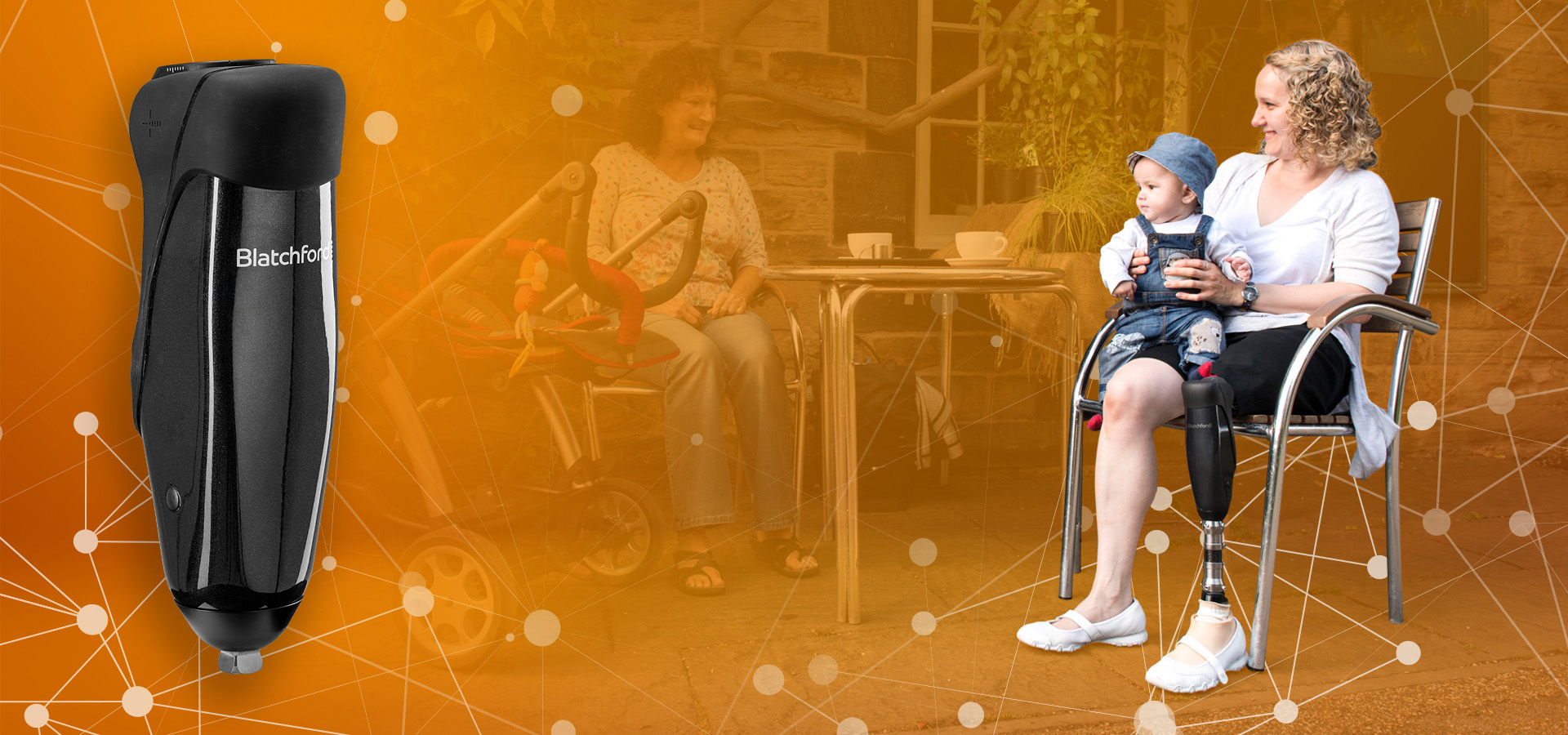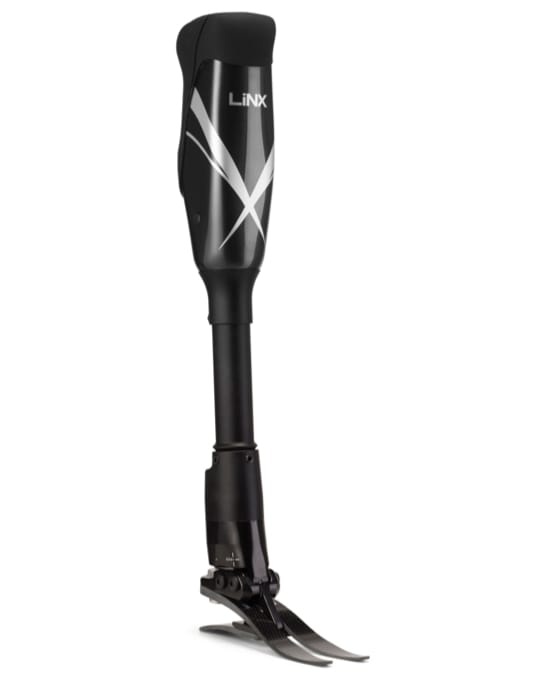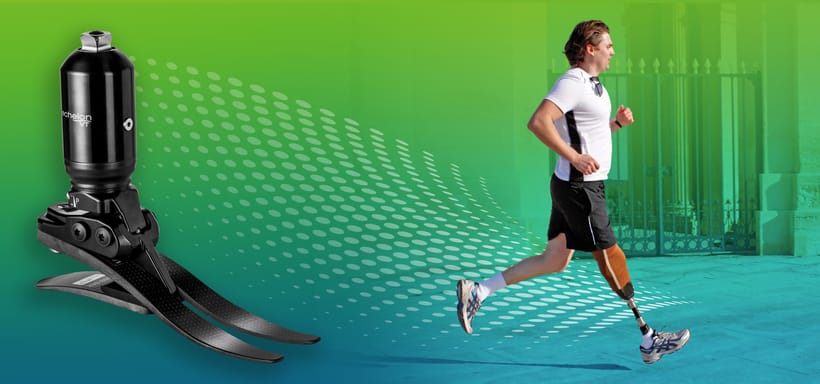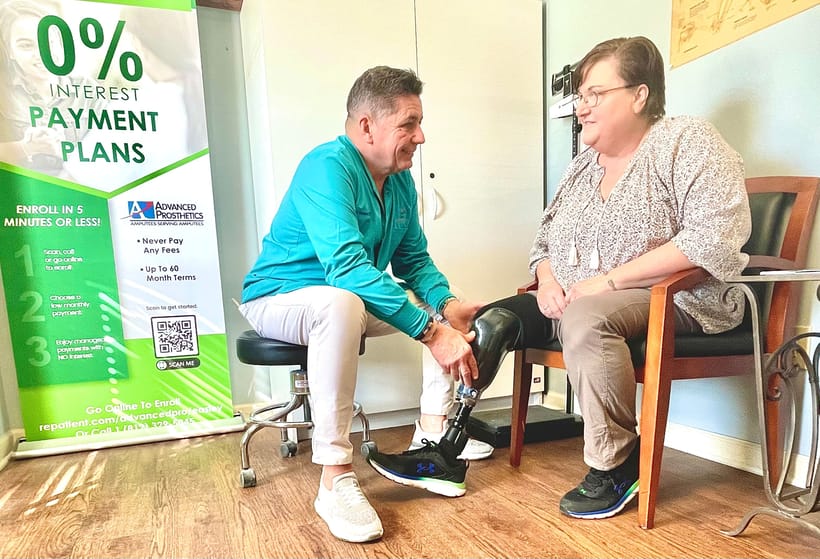Better Together: Orion 3 Microprocessor Knee
Posted on Saturday, April 29, 2023

There’s an old saying: “A problem shared is a problem halved; a joy that’s shared is a joy made double.”
Nowhere is this demonstrated more clearly than when a family member encounters a major life change - the loss of a job, a divorce or separation, a move to a new city - or a serious medical condition or trauma, such as the loss of a limb. Limb loss and the resulting necessity to adapt to an artificial substitute inevitably bring about a significant alteration in the amputee’s abilities, activities, lifestyle, and often, their attitude.
An amputee’s success in learning to adapt, and to function successfully with their new prosthesis may depend largely on the influence of their family, friends and associates, who provide encouragement, enthusiasm, motivation, and recognition of the amputee’s goals - and their progress and successes toward achieving them.
Doing better together is a principle long recognized by the Amputee Coalition, who has designated April as Limb Loss and Limb Difference Awareness Month (LLLDAM) and encourages us all to celebrate it with them. Their statistics reflect a growing total of more than 2.7 million people who live with limb loss or limb difference in the United States - a number that will nearly double by 2050, they predict.
During the month of April, the Amputee Coalition strives to demonstrate how their community thrives by inspiring and elevating one another to realize their potential and achieve their individual goals. By joining them in sharing the amazing stories of inspirational people, promoting education, and providing the most effective possible prosthetic solutions for amputees in pursuit of mobility at every level of need, Blatchford supports their commitment to making sure that no amputee is alone.
A new amputee’s emotional and psychological well-being may indeed depend largely on the level of support, understanding and encouragement they receive from their family and friends. Many physicians and prosthetists make it a point to meet with family members and counsel them on what to expect as the patient learns to adapt to their new prosthesis; they offer advice and guidance on how best to respond to the patient’s possible depression and discouragement, when to volunteer assistance or encouragement, and how much to offer.
The psychological support a new amputee receives from their family can be even more important than the physiological support received from their physician, prosthetist, and therapist in complementing their individual efforts to learn to use the prosthesis.
Partnering with a prosthesis

Choosing the most appropriate prosthesis for their need is, of course, also vital: the right lower limb prosthesis can make a world of difference in making it easier and more enjoyable to adapt to daily activities and thrive beyond them.
Compared to mechanical prosthetic knees, microprocessor-controlled devices such as the Orion3 knee take the ‘work’ out of walking by providing superbly efficient functionality, guided by a microprocessor ‘brain’ that learns its wearer’s natural gait, recognizing and adapting to the dynamic changes required for real-world navigation. On-board sensors feed information to the microprocessor faster than conscious thought - data which enables the microprocessor to read, adjust, and adapt to every move rapidly and reflexively, mimicking natural reaction. This empowers the wearer to move more freely in everyday situations, speeding up or slowing down on flat terrain and even negotiating slopes, stairs, and uneven terrain.
The result is that the prosthesis wearer doesn’t have to consciously plan and prepare for every step he or she takes, as is necessary with traditional prosthetic knee joints. They can walk while Orion remains vigilant.
Orion3’s recent improvements include new enhancements that work even ‘better together’ with its intelligent microprocessor, encouraging activity level 3 walkers to step out with confidence to safely explore different terrains and speeds.
A stance flexion feature now provides higher resistance for abrupt stops or slowdowns; this extra measure of support offers more control and stability, while a freshly added algorithm adjustment allows the limb to extend fully during the first step of stair descent, making the process easier and more predictable.
In practice, new users report amazement during their first test walk with Orion3: “Within minutes, I was walking step over step down stairs, and up and down ramps with a big smile!” one patient recalls. “I told my prosthetist, ‘Don’t take this knee away from me!”
An independent comparative study of microprocessor knee models noted that “one of the key Orion3 features that led to the Orion’s proven stability…is the ‘dynamic slope and stair descent’ feature, which gives the patient more controlled and confident descent step over step.”
The study also found that Orion3 appeared to be the most resilient to age - maintaining functional mobility for patients of all ages, perhaps due to its ‘stumble recovery’ capability. As its sensors recognize the difference, Orion3 reacts instantly to any abnormal steps and imbalance and initiates quick recovery from missteps to help prevent a fall.
In standard and validated assessments of amputee mobility, Orion3 topped other microprocessor knees for mobility and longevity; and also continued to lead others in safety - demonstrating a statistically significant reduction in injurious falls when compared to mechanical knees. Walking or standing feels safer thanks to this technology.
Stability while standing and during sitting are important areas where Orion3 also shines: “Orion’s ‘supported sitting’ provides stability even as one sits [down into a chair],” the study finds. “Progressive resistance provides immediate resistance that increases as knee flexion increases. This encourages balanced limb loading while lowering into a chair, for more controlled sitting.”
One Orion wearer confirms that “…the support (while) sitting down is really good; sitting down with a baby, rather than relying on my good leg to lower all my body weight down, I can spread the weight evenly between both, and I sit down a lot steadier and slower - I can rely on that (Orion) leg more.”
Patient satisfaction scores also put Orion3 at the top of chart with measurements of the highest median satisfaction from those using the knee.
Regardless of your choice…
…an appropriate prosthesis that enables and encourages exercise and fitness also thereby nurtures better health and mobility.
Increased mobility brings with it a wealth of additional health boosters: Regular exercise leads to improved overall fitness, which contributes to a healthy, active metabolism that benefits all parts of the body.
Participation in a variety of types of recreational fitness exposes one to new opportunities and experiences, including social activities and new friendships.
“It’s quite life-changing,” reflects an Orion-wearing mom. “I can go out and not worry about falling, and I’ve got more energy. It’s just not having to think about being an amputee - being able to go out and do what everyone else does.”
And ultimately, better fitness simply feels better, imbuing one with a sense of well-being and - satisfaction - and an attitude invested with optimism. And optimism is empowering, as well:
“I can walk up slopes,” marvels another Orion wearer, “... and don’t even notice it! I have total confidence in this knee. I’m not going to be so likely to say no to things; I’m going to be a lot more adventurous in what I pursue!”
As Blatchford joins with the Amputee Coalition in celebrating LLDAM, we also share their commitment to helping the community thrive, and each to realize their full potential. In so doing, our vision is not just to replace a limb, but to open a world of new possibilities, and the opportunity to explore life beyond movement.
More articles
-

Be All You Can Be: Linx Limb System
LINX PROSTHETICS MICROPROCESSORS MPK LIMB SYSTEMPosted on Friday, April 12, 2024 , in Prosthetics
-

Take a Load off Your Foot: Echelon VT
ECHELONVT PROSTHETICS HYDRAULICS PROSTHETIC ANKLE PROSTHETIC FOOTPosted on Friday, April 12, 2024 , in Prosthetics
-

Blatchford Access (powered by Repatient) is designed to help people pay for the prosthetic care they need.
BLATCHFORD ACCESS PROSTHETICS REPATIENTPosted on Friday, April 12, 2024 , in Prosthetics